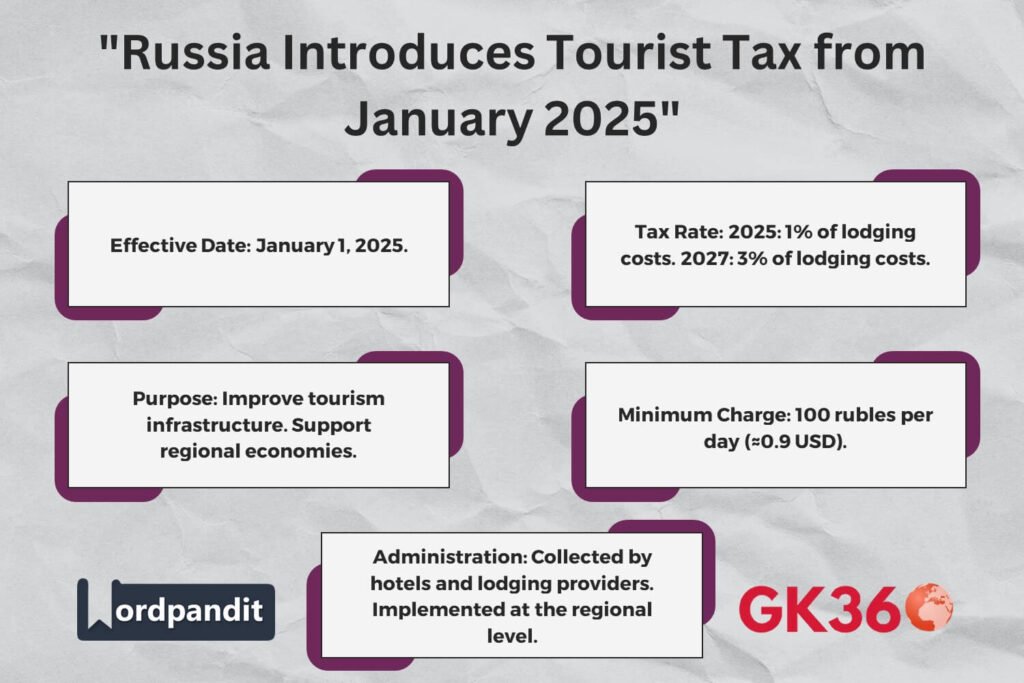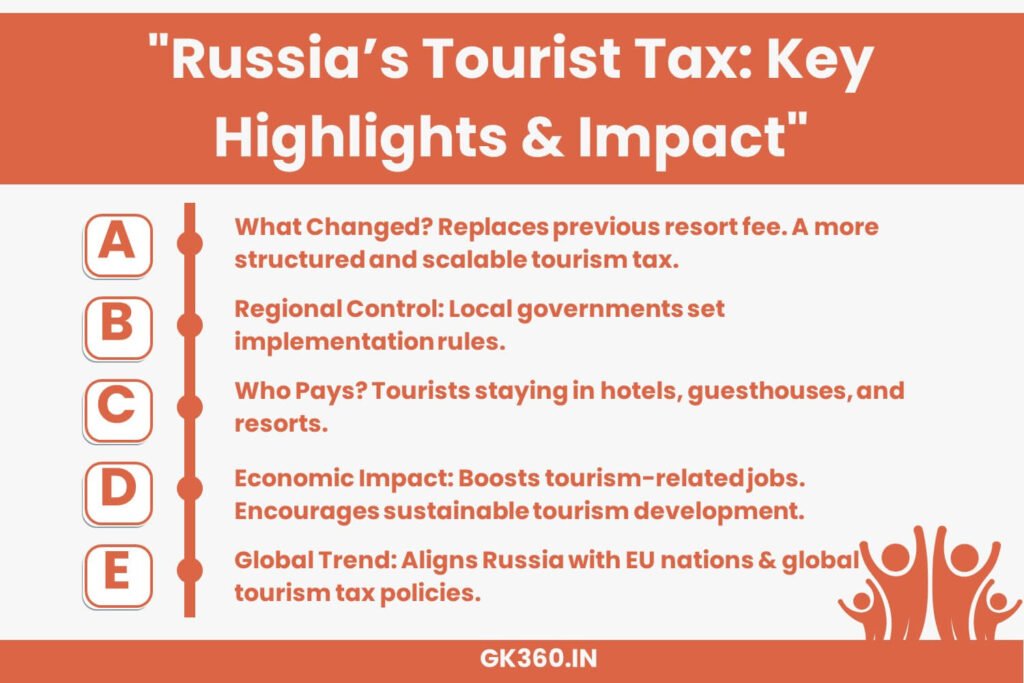Russia Implements New Tourist Tax Starting January 1, 2025
Introduction
Starting January 1, 2025, Russia has implemented a new tourist tax aimed at improving its regional tourism infrastructure. This measure replaces the previously existing resort fee and is being rolled out under a phased plan. Enacted through amendments to the Russian Tax Code, the tax provides a structured approach to enhancing tourism-related services across the country. The initial levy of 1% on travelers’ lodging costs will gradually increase to 3% by 2027, marking a significant shift in Russia’s approach to tourism-related levies.

Table of Contents
- Key Features of the Tourist Tax
- Legislative Background
- Regional Authority and Flexibility
- Collection Mechanism
- Transition from the Resort Fee
- Summary of Key Details
- FAQs About Russia’s Tourist Tax
- Conclusion
Key Features of the Tourist Tax
Implementation Date
The new tourist tax takes effect on January 1, 2025 as part of a broader initiative to align Russia’s tourism policies with international best practices.
Tax Rates
- 2025: 1% of travelers’ lodging expenses.
- 2027: Gradually increasing to 3%.
- Minimum Daily Charge: 100 rubles (≈0.9 USD) to ensure that even budget accommodations contribute.
Purpose of the Tax
- The collected revenues will:
- Bolster regional tourism infrastructure.
- Support local economies.
- Enhance the overall travel experience in Russia.
Legislative Background
- The tourist tax was introduced through amendments to the Russian Tax Code in July 2024.
- A new chapter, “Tourist Tax”, outlines the objectives, implementation mechanisms, and administrative guidelines.
- This structured approach ensures scalability and long-term sustainability.
Regional Authority and Flexibility
- Russian regional authorities have been given the power to implement the tax as a local levy.
- Regions can tailor the tax based on their tourism needs.
- This flexibility encourages regional competitiveness and investment in tourism infrastructure.
Collection Mechanism
- Hotels and lodging providers are responsible for collecting the tax.
- The tax is integrated into accommodation pricing, making it a seamless process for tourists.
- The streamlined approach ensures uniform application across different types of accommodations.
Transition from the Resort Fee
- The tourist tax replaces the earlier resort fee, which was less structured and limited in scope.
- The new tax provides a comprehensive and scalable framework for sustainable tourism funding.
Summary of Key Details
| Aspect | Details |
|---|---|
| Why in the News? | The rollout of Russia’s tourist tax begins on January 1, 2025. |
| Initial Tax Rate | 1% of lodging costs in 2025. |
| Future Tax Rate | Increases to 3% by 2027. |
| Minimum Daily Charge | 100 rubles (≈0.9 USD). |
| Purpose | Strengthen regional tourism infrastructure and boost local economies. |
| Legislative Basis | Amendments to the Russian Tax Code, with a new chapter titled “Tourist Tax”. |
| Regional Authority | Regions have discretion to impose the tax as a local levy. |
| Taxpayer | Hotels and lodging providers, with costs passed on to tourists. |
| Predecessor | Replaces the earlier resort fee with a more structured framework. |
FAQs About Russia’s Tourist Tax
- Why is Russia introducing a tourist tax?
The tax is aimed at improving tourism infrastructure, supporting local economies, and enhancing visitor experiences. - How much will travelers have to pay?
• 2025: 1% of lodging costs.
• 2027: 3% of lodging costs.
• Minimum charge: 100 rubles per day. - Who is responsible for collecting the tax?
Hotels, guesthouses, and other lodging providers will collect the tax and remit it to regional authorities. - Will this tax apply to all regions in Russia?
Each region has the authority to adopt and tailor the tax based on local tourism needs. - What does the tax revenue fund?
Funds will be invested in tourism infrastructure, including roads, attractions, and local services.
Conclusion
The introduction of Russia’s tourist tax is a strategic move to modernize its approach to tourism infrastructure funding. By implementing the levy gradually and involving regional authorities, the government aims to foster sustainable tourism growth while ensuring that the burden on tourists remains manageable.
With its structured framework and long-term vision, this initiative promises to:
- Enhance Russia’s appeal as a global travel destination.
- Provide much-needed support to regional economies.
- Establish a sustainable funding mechanism for tourism development.
Key Takeaways Table
| Aspect | Details |
|---|---|
| Why in the News? | Russia introduces tourist tax from January 2025. |
| Tax Rate | 1% in 2025, increasing to 3% by 2027. |
| Minimum Charge | 100 rubles/day (~$0.9 USD). |
| Purpose | Develop tourism infrastructure, support regional economies. |
| Collection Method | Hotels & lodging providers collect the tax. |
| Regional Authority | Local governments can modify implementation. |
| Predecessor | Replaces the old resort fee. |
Related terms
- Russia Tourist Tax 2025 Implementation
- New Tourism Tax in Russia January 2025
- Russia Hotel Tax Policy for Visitors
- Tourist Levy in Russia Travel Updates
- Russia Travel Costs Increase Due to New Tax
- Moscow and St. Petersburg Hotel Tax 2025
- How Russia’s Tourism Tax Affects Travelers
- Russia Taxation on Foreign Tourists
- Global Tourist Taxes and Travel Expenses
- New Tourism Fees in Russia for Visitors 2025






